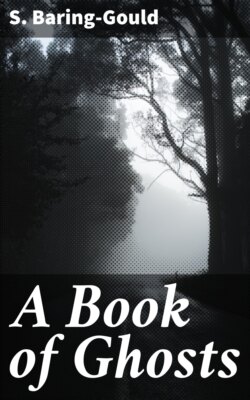Читать книгу A Book of Ghosts - S. (Sabine) Baring-Gould - Страница 6
На сайте Литреса книга снята с продажи.
"JEAN BOUCHON
MORT SUR LE CHAMP DE GLOIRE
1870
DULCE ET DECORUM EST PRO PATRIA MORI."
Оглавление"Why!" objected I, "he died from falling a cropper in the back passage, not on the field of glory."
"Monsieur! all Orléans is a field of glory. Under S. Aignan did we not repel Attila and his Huns in 451? Under Jeanne d'Arc did we not repulse the English—monsieur will excuse the allusion—in 1429. Did we not recapture Orléans from the Germans in November, 1870?"
"That is all very true," I broke in. "But Jean Bouchon neither fought against Attila nor with la Pucelle, nor against the Prussians. Then 'Dulce et decorum est pro patria mori' is rather strong, considering the facts."
"How? Does not monsieur see that the sentiment is patriotic and magnificent?"
"I admit that, but dispute the application."
"Then why apply it? The sentiment is all right."
"But by implication it refers to Jean Bouchon, who died, not for his country, but in a sordid coffee-house brawl. Then, again, the date is wrong. Jean Bouchon died in 1869, not in 1870."
"That is only out by a year."
"Yes, but with this mistake of a year, and with the quotation from Horace, and with the attitude given to the figure, anyone would suppose that Jean Bouchon had fallen in the retaking of Orléans from the Prussians."
"Ah! monsieur, who looks on a monument and expects to find thereon the literal truth relative to the deceased?"
"This is something of a sacrifice to truth," I demurred.
"Sacrifice is superb!" said the waiter. "There is nothing more noble, more heroic than sacrifice."
"But not the sacrifice of truth."
"Sacrifice is always sacrifice."
"Well," said I, unwilling further to dispute, "this is certainly a great creation out of nothing."
"Not out of nothing; out of the coppers that Jean Bouchon had filched from us, and which choked up his coffin."
"Jean Bouchon has been seen no more?"
"No, monsieur. And yet—yes, once, when the statue was unveiled. Our patron did that. The café was crowded. All our habitués were there. The patron made a magnificent oration; he drew a superb picture of the moral, intellectual, social, and political merits of Jean Bouchon. There was not a dry eye among the audience, and the speaker choked with emotion. Then, as we stood in a ring, not too near, we saw—I was there and I distinctly saw, so did the others—Jean Bouchon standing with his back to us, looking intently at the statue of himself. Monsieur, as he thus stood I could discern his black mutton-chop whiskers projecting upon each side of his head. Well, sir, not one word was spoken. A dead silence fell upon all. Our patron ceased to speak, and wiped his eyes and blew his nose. A sort of holy awe possessed us all. Then, after the lapse of some minutes, Jean Bouchon turned himself about, and we all saw his puffy pale cheeks, his thick sensual lips, his broken nose, his little pig's eyes. He was very unlike his idealised portrait in the statue; but what matters that? It gratified the deceased, and it injured no one. Well, monsieur, Jean Bouchon stood facing us, and he turned his head from one side to another, and gave us all what I may term a greasy smile. Then he lifted up his hands as though invoking a blessing on us all, and vanished. Since then he has not been seen."
